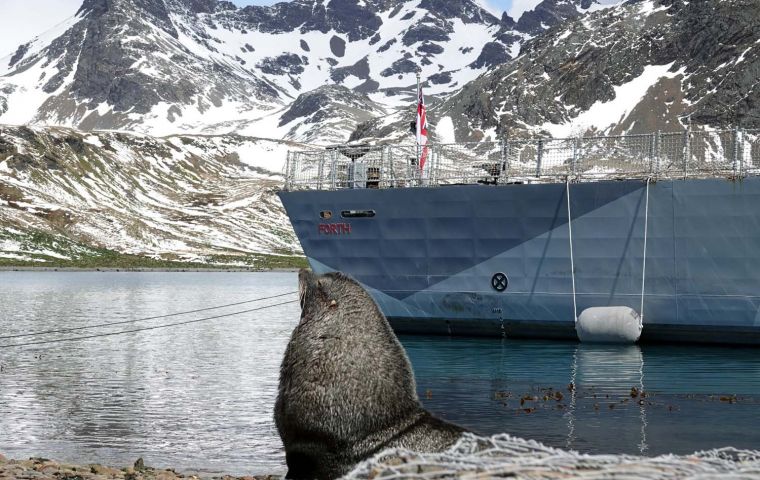MercoPress. South Atlantic News Agency
HMS Forth helps to understand extent of avian flu in South Georgia
 A seal keeps watch on HMS Forth at Grytviken
A seal keeps watch on HMS Forth at Grytviken Crew of Royal Navy Falklands patrol ship HMS Forth helped scientists understand the global impact of bird flu as the ship resumed South Atlantic duties after nearly a year away. The ship transported an expert to the island chain of South Georgia to see if the disease had reached the sub-Antarctic for the first time.
Enter Dr Marco Falchieri of the Animal and Plant Health Agency’s Influenza and Avian Virology team. With access to South Georgia possible only by sea – there’s no airstrip – HMS Forth provided transport from the Falklands and, once at the destination, ferried Dr Falchieri around and helped him in taking samples from dead wildlife, notably elephant seals and birds.
The archipelago, which lies about 800 miles from the Falkland Islands, is barely habited by humans, but has a rich wildlife populace.
Last autumn, however, observers noted unusual deaths among birdlife on the aptly-named Bird Island, a haven for avian wildlife just off the coast of South Georgia. That prompted formal research, demanding an expert.
Analyzed at labs back in the UK, the samples proved that the disease – officially known as High Pathogenicity Avian Influenza or HPAI – has reached the fringe of the Antarctica, probably carried there by migratory birds.
It’s not prevalent yet, and it doesn’t seem to have infected or had an impact on the penguin populace, but elephant seals, fur seals, brown skuas, kelp gulls and Antarctic terns have all been hit and experts are taking steps to keep the disease in check.
“South Georgia was absolutely stunning, I have never been anywhere like it in my life,” said seaman specialist Able Seaman Dan Crewdson.
For Forth’s Commanding Officer Commander Chris Easterbrook after spending much of 2023 in dock or alongside, it’s been good for the ship to return to her regular ‘beat’.
The ship spent nine months away, most of them in Gibraltar as she became the first in her class to undergo ‘deep maintenance’: work on her hull, engines, shafts, a fresh coat of paint as well as upgrades to weapons and communication systems. Improvements to mess decks and living quarters were also completed, improving the lived experience of the ship’s company.
The ship returned to the Falklands via the western coast of Africa, allowing visits to Cape Verde, Ghana and Namibia where Forth used the rare opportunity to showcase the RN, UK and capabilities of the River class by hosting events for VIPs, while the football team’s year-long unbeaten run came to an end at the hands of a local side who triumphed 2-0.
Now back on-task after a full ‘MOT’, her place in the yard in Gibraltar has been taken by HMS Medway, which stood in for Forth for most of last year.
Having reacquainted herself with the Falklands – where the average temperature in December (the equivalent of June in the Northern Hemisphere) is 12-15 Celsius… which is colder than Gib.
“HMS Forth has worked extremely hard over the past 12 months, upgrading and refurbishing our systems so that we can remain fighting-fit for another five years,” he said.
“In particular, I’m immensely proud of the ship’s engineers, who worked hand-in-glove with industrial partners from Gibraltar and the UK to make this highly complex engineering project a success.
“We are now very excited to be back in the South Atlantic to renew our bonds with the Falkland Islands and work together with our colleagues from the British Army and Royal Air Force.”(RN)




Top Comments
Disclaimer & comment rulesCommenting for this story is now closed.
If you have a Facebook account, become a fan and comment on our Facebook Page!